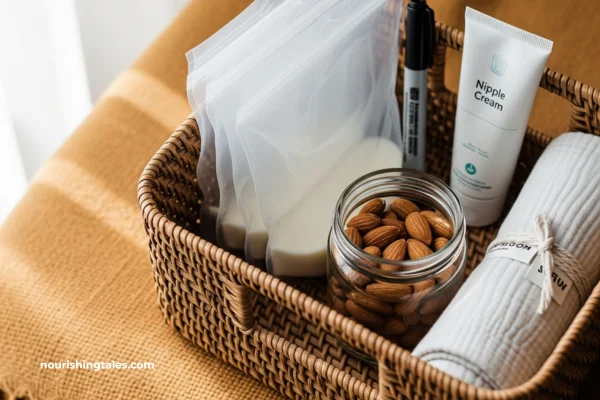Mental preparation for pumping goes beyond the physical act itself. It’s 3 AM, the house is quiet, and the only sound is the rhythmic whir of your breast pump. If you’re feeling exhausted, overwhelmed, and maybe just a little bit touched-out, I want you to know one thing: you are not alone.
This article isn’t about boosting your supply or finding the perfect schedule. We have plenty of resources for that. This is about you, the incredible, hardworking person operating the pump.
In the endless cycle of pumping, washing, and storing, it’s so easy for your own well-being to get lost. The emotional weight of this journey is real, and it’s the part we don’t talk about enough. So let’s change that. Let’s talk about how to protect your mental and emotional health while you do this amazing thing for your baby.
First, Let’s Acknowledge the Feelings (It’s Okay to Feel This Way)
Before we do anything else, let’s honour what you’re feeling. Your emotions are not an overreaction; they are a completely normal response to a demanding, round-the-clock job. If any of this sounds familiar, please know you are in good company.
- You feel tethered to a machine. The constant hum, the rigid schedule, the need to always be near a power outlet… it can feel like you’re on a very short leash. This feeling of being anchored, both physically and mentally, is one of the most common challenges of pumping.
- You feel anxious about the numbers. It’s so easy to start measuring your worth in millilitres. A ‘good’ session brings a sigh of relief, but a session with less volume can trigger a wave of panic. Those numbers on the bottle will never define your worth as a parent.
- You feel ‘touched-out’ and just want your body back. Between holding, feeding, and pumping, it can feel like your body isn’t your own anymore. It’s completely normal to crave the simple feeling of just being in your own skin without anyone or anything attached to you.
- You feel lonely during late-night pumps. In the stillness of the night, it can feel like you’re the only person awake in the world. But we promise you, in countless homes across India, another parent is sitting up, doing the exact same thing, feeling the exact same way.
- You feel guilty if you think about stopping. The idea of supplementing with formula or ending your pumping journey can come with a heavy feeling of guilt. This is a complex emotion, tangled up in societal expectations and personal goals. Please hear this: there is no room for guilt in a journey fuelled by so much love.
If you nodded along to any of these, take another slow, deep breath. What you are feeling is real, it is valid, and you are not the only one.
Actionable Ways to Protect Your Peace
Protecting your mental health isn’t about adding more to your to-do list. It’s about gently shifting your mindset and giving yourself grace.
1. Redefine Your Idea of “Success”
Right now, success might feel like a bottle filled to a specific line. Let’s gently challenge that. What if success was simply showing up for this pumping session? What if success was acknowledging, “I am nourishing my baby in so many ways today”?

Every drop you produce is a gift, but it’s not the only one you give your child. Your presence, your cuddles, and your love are the real nourishment. Shift your goal from a number (mL) to an intention: “I am doing my best, and my best is enough.” If you do decide you want to explore ways to gently encourage your body, here are some tips to increase your milk supply, but remember to always put your well-being first.
2. Reclaim Your Pumping Time
This time is already blocked out in your day. Instead of seeing it as a chore, can you reframe it as your time? It’s a non-negotiable, 20-minute pause where you are required to sit down. Use it for you.

- Pop in your headphones and listen to a podcast or an audiobook.
- Watch a silly comedy show on your phone that makes you laugh out loud.
- Use a meditation app for a short, guided session.
- Simply close your eyes and focus on your breathing—not on the sound of the pump.
3. Automate and Simplify to Conserve Your Energy
Your energy is a precious resource right now. Let’s protect it.
- Get extra pump parts. This is one of the kindest things you can do for yourself. Having two or three full sets of flanges, valves, and bottles means you’re not constantly rushing to wash parts. You can put the used set aside and wash everything together once or twice a day.
- Create a dedicated pumping station. Having a basket or a corner with everything you need makes a world of difference. Not sure where to start? We’ve put together a list of pumping station essentials to make it easy for you.
4. Find Your Pumping Tribe
Isolation makes every challenge feel ten times heavier. Find people who just get it. This could be a local parents’ group on WhatsApp, an online forum, or even just one friend who has been there. Being able to send a quick text at 2 AM saying, “This is so hard,” and getting a reply that says, “I know. You’re doing great,” can be a true lifeline.

5. Practice Radical Self-Compassion Imagine your best friend was sitting where you are, feeling this way. What would you say to her? You’d tell her she is a wonderful mother and that she’s doing an incredible job. Now, try to offer that same kindness to yourself. When that critical inner voice gets loud, gently tell it, “I am doing the best I can with what I have, and that is more than enough.”
How Your Partner and Family Can Be Your Pumping Champions
Your loved ones want to help, but they might not know how. Sharing this list with them can give them specific, actionable ways to support you.
- Take complete charge of washing all pump parts. This lifts a huge, practical task off your shoulders.
- Keep the water bottle full. Hydration is crucial, and having someone else manage this small but important task is a big help.
- Bring a nutritious snack during pumping sessions. A bowl of fruit, a handful of nuts, or a glass of warm milk can make a huge difference.
- Offer a quick 5-minute shoulder or foot rub. This small act of care can release so much physical and mental tension.
- Give encouragement that isn’t about volume. Instead of asking, “How many ounces did you get?” try saying, “You are working so hard for our baby, and I am so proud of you,” or simply, “Thank you for doing this.”
Knowing When It’s More Than the “Baby Blues”
It’s common to feel tearful and overwhelmed in the first couple of weeks after birth (often called the “baby blues”). However, if these feelings don’t go away or start to get worse, it could be a sign of Postpartum Depression (PPD) or Postpartum Anxiety (PPA).
Please know that this is not a sign of weakness or a personal failure. It is a real, treatable medical condition. You may need more support if you consistently experience:
- Persistent feelings of sadness, hopelessness, or emptiness
- Overwhelming anxiety or panic attacks
- Scary, intrusive thoughts you can’t shake
- A loss of interest in things you used to enjoy
- Difficulty sleeping even when the baby is sleeping
- Thoughts of harming yourself or your baby
If any of this resonates, reaching out for help is a sign of incredible strength. Please speak to your gynaecologist, a trusted GP, or a mental health professional. You do not have to carry this weight alone.
A Final Note From My Heart to Yours
As you finish reading this, please hear this loud and clear: You are more than your milk supply.
You are the warm arms that comfort your baby. You are the gentle voice that soothes them. You are the steady, loving presence that makes them feel safe. Your worth as a parent is not, and will never be, measured in millilitres.
Taking care of yourself isn’t selfish—it’s essential. Be kind to yourself, dear parent. You are doing a beautiful, incredible job.
- Disclaimer: This article is for informational purposes only and does not constitute medical advice. It is not a substitute for professional medical advice, diagnosis, or treatment. Always seek the advice of your physician or another qualified health provider with any questions you may have regarding a medical condition.
- Mental Health Support Resource for India: If you are struggling, please consider reaching out. The NIMHANS Centre for Well Being offers psychological counselling and psychiatric services. You can also speak to your doctor for a referral to a local mental health professional specializing in perinatal care.





